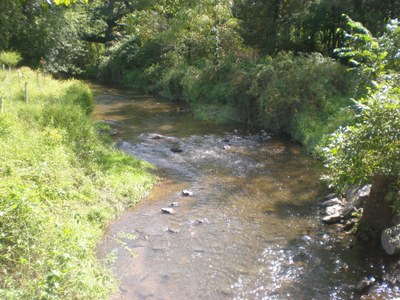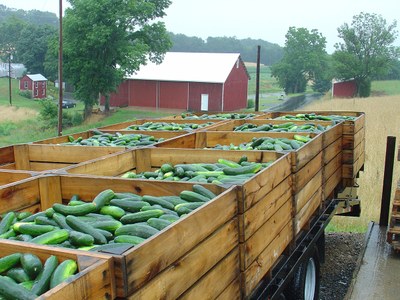Penn State Extension is a regional, national, and international leader in understanding the natural and human systems underlying agricultural sciences and sharing that information for the benefit of all.
Impacting today's most critical agricultural issues.
Information is power and it changes lives. Putting innovation and science-based solutions to work in businesses and communities across Pennsylvania, and often beyond, is more than a job to us—it's a calling. To carry on that legacy, Penn State Extension is continuing to evolve in a digital era and capitalize on the innovation and technologies that enable us to put every resource imaginable at your fingertips.
Penn State Extension dives into water quality education and resources.
 Pennsylvania is blessed with an abundance of water—86,000 miles of rivers, streams, and creeks to be exact. Ensuring those waters are free of contaminants is important for health, quality of life, recreation, and the economy. Every citizen plays a role, and Penn State Extension is there to provide direction, offering evidence-based recommendations for conserving our Commonwealth's waterways.
Pennsylvania is blessed with an abundance of water—86,000 miles of rivers, streams, and creeks to be exact. Ensuring those waters are free of contaminants is important for health, quality of life, recreation, and the economy. Every citizen plays a role, and Penn State Extension is there to provide direction, offering evidence-based recommendations for conserving our Commonwealth's waterways.
Equally important is the Chesapeake Bay, the largest estuary in the United States. Pennsylvania plays a big part in the restoration of this crucial resource—about half of the state drains to the bay, and the Susquehanna River is its largest tributary, providing about 50 percent of its fresh water.
Our award-winning outreach programs are designed to help homeowners, farmers, municipalities, and corporations better understand how to be good stewards of water resources.
Explore more water quality resources from Penn State Extension.
Penn State Extension peels back the layers of the Food Safety Modernization Act.
 Each year in the United States, 48 million people get sick, 128,000 are hospitalized, and 3,000 die from foodborne diseases, according to the Centers for Disease Control and Prevention (CDC). Preventing these types of outbreaks is the reason behind the Food Safety Modernization Act (FSMA), which establishes regulatory practices that produce farmers, food processors, and feed manufacturers must adopt to prevent contamination of fresh produce and processed and manufactured human foods and animal feeds.
Each year in the United States, 48 million people get sick, 128,000 are hospitalized, and 3,000 die from foodborne diseases, according to the Centers for Disease Control and Prevention (CDC). Preventing these types of outbreaks is the reason behind the Food Safety Modernization Act (FSMA), which establishes regulatory practices that produce farmers, food processors, and feed manufacturers must adopt to prevent contamination of fresh produce and processed and manufactured human foods and animal feeds.
Penn State Extension was at the table early when it came to FSMA education, forming a cross-disciplinary team of faculty, staff, and statewide extension educators with expertise in the areas of feed and food safety. Together, the team conducts numerous training sessions across the state focusing on various topics of the law.
Find out more about FSMA from Penn State Extension.
Penn State Extension puts a spotlight on the spotted lanternfly.
 The spotted lanternfly, a planthopper native to Central Asia, has been wreaking havoc since it made its debut in Berks County, Pennsylvania, in 2014, and quickly spread throughout the southeastern part of the state. Not only does the destructive pest render outdoor areas unusable by leaving behind a sugary excrement called honeydew, it also threatens the state's economy by feasting on important agricultural crops, landscapes, and natural ecosystems.
The spotted lanternfly, a planthopper native to Central Asia, has been wreaking havoc since it made its debut in Berks County, Pennsylvania, in 2014, and quickly spread throughout the southeastern part of the state. Not only does the destructive pest render outdoor areas unusable by leaving behind a sugary excrement called honeydew, it also threatens the state's economy by feasting on important agricultural crops, landscapes, and natural ecosystems.
The role of Penn State agricultural researchers and extension educators—as part of the University's land-grant mission—is to bring science-based information to bear in solving emerging issues such as the spotted lanternfly. Our team works with government, industry, and agriculture representatives to identify specific strategies to combat the insect invader.
Find out more about spotted lanternfly from Penn State Extension.
"It's going to take more than one state, one university, and one regulatory agency to defeat this pest. This is a war that is going to take an army and tons of reinforcements to win."
—Heather Leach, Penn State's Spotted Lanternfly Extension Associate
Penn State Extension reins in disease through biosecurity outreach.
 Poultry and livestock producers rely on Penn State's animal disease surveillance and biosecurity recommendations to keep their animals healthy and avoid infectious diseases such as avian flu. Good biosecurity is a preventive approach to maintaining herd health since effectively minimizing the risk of disease should minimize the occurrence of disease.
Poultry and livestock producers rely on Penn State's animal disease surveillance and biosecurity recommendations to keep their animals healthy and avoid infectious diseases such as avian flu. Good biosecurity is a preventive approach to maintaining herd health since effectively minimizing the risk of disease should minimize the occurrence of disease.
To that end, we share information on how to minimize or prevent the transmission of disease within and between herds and flocks through biosecurity management practices such as testing and screening for infectious agents, isolation/quarantine of infected animals, immunization, selective purchasing, animal monitoring, and herd evaluation.
Learn more about avian influenza from Penn State Extension.
In the event of an outbreak, Penn State's Animal Diagnostic Laboratory can test up to 1,600 samples a day for avian flu, a virus that could have a $13 billion economic impact on Pennsylvania's poultry industry.

